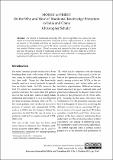Files in this item
Money or pride? On the why and how of traditional knowledge protection in India and China
Item metadata
| dc.contributor.author | Schulz, Christopher | |
| dc.date.accessioned | 2022-09-05T11:30:03Z | |
| dc.date.available | 2022-09-05T11:30:03Z | |
| dc.date.issued | 2011-10-01 | |
| dc.identifier | 277618001 | |
| dc.identifier | d5af16e9-cc9a-4e39-a472-2c7516eea12b | |
| dc.identifier.citation | Schulz , C 2011 , ' Money or pride? On the why and how of traditional knowledge protection in India and China ' , Konstanzer Journal für Politik und Verwaltung , vol. 1 , no. 1 , pp. 52-62 . | en |
| dc.identifier.uri | https://hdl.handle.net/10023/25946 | |
| dc.description.abstract | The interest in traditional knowledge (TK) and its importance as a source for innovation in science and medicine have been rising and so have conflicts around it. In this article, the policies on TK of India and China are reviewed and analysed. While India put emphasis on preventing the unauthorized use of its TK, China is mainly concerned about integrating its TK into modern Western science. China’s economy and research facilities are growing at a faster pace and TK policy is centred on traditional Chinese medicine. In turn, India has a great variety of equally important TK traditions, which are more vulnerable to misappropriation thus explaining the differences between the two countries’ policies. | |
| dc.format.extent | 194927 | |
| dc.language.iso | eng | |
| dc.relation.ispartof | Konstanzer Journal für Politik und Verwaltung | en |
| dc.subject | JQ Political institutions Asia | en |
| dc.subject.lcc | JQ | en |
| dc.title | Money or pride? On the why and how of traditional knowledge protection in India and China | en |
| dc.type | Journal article | en |
| dc.contributor.institution | University of St Andrews. School of Geography & Sustainable Development | en |
| dc.description.status | Peer reviewed | en |
| dc.identifier.url | https://www.polver.uni-konstanz.de/en/ | en |
This item appears in the following Collection(s)
Items in the St Andrews Research Repository are protected by copyright, with all rights reserved, unless otherwise indicated.

